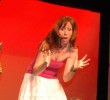What to do when opening night for your world premiere play’s coming right up and your lead actress, distracted by your lead actor, steps off the stage and pops her knee? Promote your intern to understudy, and hope she doesn’t have to go up against the critics.
That’s the set-up for Falling in Like, the latest comic offering at Haywood Arts Regional Theatre, and if it sounds a bit hackneyed, don’t let that put you off. A story, per se, never matters so much as the handling, and writer/director Jerry Sipp’s sure handling of his material and cast makes for fine entertainment.
There’s a fair amount of theatrical inside baseball — the stuff of acting training and technique, and of Equity contracts; quotes from and references to everything from Shakespeare and Chekhov to Sondheim and, of all unlikely candidates, considering the light hand at work throughout, Samuel Beckett. But don’t let that put you off, either, because no special knowledge is required to appreciate the saga of what it takes to be an actor, and what the cost may be for preserving your privacy while practicing the most public of arts: appearing live onstage. Oh, and there’s a not-quite-love story, to boot.
Much of what transpires is standard issue, though wittily scripted with a pleasingly high percentage of winning zingers. Most of the characters are flat, though that’s a time-honored comic tradition, too, and the actors make the most of their opportunities:
• Jeff Douglas Messer, himself a playwright as well as an actor, director, and producer, plays an appropriately frazzled playwright constantly forced to rewrite as others improvise lines much better than his,
• Jennifer Sanner amuses as the lead actress determined to return to the stage, no matter what. Preston Tinsley makes for a genial director, taking the travails of his production-to-be with the sangfroid only available to the richly experienced,
• Allison Stinson, in a turn as far removed as imaginable from her recent appearance as the endearing, elderly lead of Walking Across Egypt, tears into her no-nonsense, slightly sex-obsessed stage manager with obvious glee,
• Chris Martin does what he can with the play’s most thankless role, that of a gay actor who remains pliable, responsive and concerned more with everyone else than himself as most of his lines are whittled away, including those that originated in his own mouth.
These performances fulfill the play’s limited demands, remaining pretty much what we’ve come to expect from community theatre. Two players, thankfully, transcend those expectations, perhaps because their roles — which reach all the way to two-dimensionality — require much more.
David Dvorscak, the actual leading actor of Falling in Like, playing the lead actor of the play within the play (of which, by the by, we see little), gives a fully professional rendition of a brilliant, charismatic actor (no small feat!) who’s far more interested in his roles than in actual people.
And Shanda Jacobs, as the intern-turned-understudy who proves less interested in making her debut than in obsessively attempting to uncover her fellow actor’s closely guarded secrets, worms her way into our hearts, despite portraying a character who could easily be as annoying to the audience as she is to the man she simply won’t leave be. There are many marvelous moments between these two, including an early-morning visit to a gym that’s especially winning, but two instances of seeing this pair first in rehearsal, and then in performance, highlight their skills and the care with which they’ve prepared these roles.
Falling in Like is a slender, affable affair. It’s impossible to say why one such well-done amusement gets produced fitfully, while others of equal or lesser merit enter the standard repertoire. Sipp may not have fashioned a work for the ages here, but this is a more-than-workmanlike effort. Real feeling and wisdom emerge along with laughs, and though the key, late-stage revelation flirts with the maudlin, the ending refuses a pat conclusion, allowing us to continue to savor the emotional mysteries the play, at its best, ponders.
Falling in Like, written and directed by Jerry Sipp. Set and lighting design by Steven Lloyd and Jerry Sipp. Stage manager: Nan Williamson. With Jennifer Sanner (Victoria), David Dvorscak (Frank), Jeff Douglas Messer (Arnie), Preston Tinsley (Jeffrey), Allison Stinson (Marge), Shanda Jacobs (Abbie), and Chris Martin (Sonny).




“Most of the characters are flat, though that is a time-honored comic tradition….”. Please explain. Playwrights setting out to write “flat comic characters in a time-honored tradition” makes no sense to me. I thought the point was to write well rounded, believable characters that were also funny It’s called Human Comedy. I must be missing the point.
Many different definitions and approaches to comedy, of course. Frequently, though, comic characters are one-dimensional–that is, defined by a single, unchanging characteristic–and there’s nothing wrong with that, necessarily. In this play, the secondary characters are flat in this regard; the leads, however, each reveal a second dimension and undergo change.
Whether one likes flat comic characters or not may be a matter of taste or a reaction to a particular work.
Critic Samuels gives a good explanation. The comic character’s “single, unchanging characteristic,” is often an obsession, something carried to excess: Moliere’s “Imaginary Invalid” and “Would-be Gentleman,” for example. Best example may be Elmer Fudd (a truly flat character) and his long-running battle against Bugs Bunny (another great flat character).
that’s from The Hairy Ape, right?